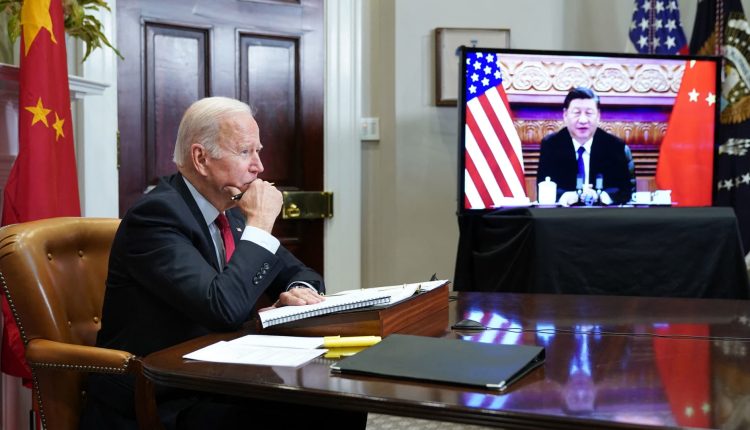U.S. President Joe Biden having a virtual meeting with his Chinese counterpart Xi Jinping from the Roosevelt Room of the White House in Washington, DC, on November 15, 2021.
Mandel Ngan | Afp | Getty Images
BEIJING — China’s Ministry of Commerce said Thursday that restoring stability in U.S.-China trade relations is the best way to “de-risk” — a twist to a term that’s become popular in international politics.
The word has been used by U.S. and EU officials as an attempt to position their countries as not completely separating from China in a decoupling scenario, but diversifying in areas where over-reliance on China poses a risk.
“We believe the best way to ‘de-risk’ is to return to the consensus agreed to by the two heads of state at Bali, return China-U.S. trade relations to a healthy, stable development path,” Shu Jueting, spokesperson at the Ministry of Commerce, said at a press conference in Mandarin, translated by CNBC.
That also “allows bilateral economic trade relations to better play the role of ‘ballast,’ stabilizing business expectations and increasing business confidence for carrying out trade and investment.”
In November last year, U.S. President Joe Biden and Chinese President Xi Jinping met in Bali, Indonesia, for their first in-person meeting since Biden took office. Their meeting kicked off formal plans for U.S. Secretary of State Antony Blinken and other U.S. senior officials to visit China this year.
As long as the two countries are not in open military conflict, I expect the U.S. and China will continue to have substantial trade and investment ties…
Scott Kennedy
Center for Strategic and International Studies
Shu pointed out that in the first seven months of this year, U.S. direct investment in China rose by 25.5% from a year ago. The Ministry of Commerce is working with local authorities to implement recently released plans for improving the environment for foreign investment, she said.
“Although there has been pullback from both sides on certain elements of the commercial relationship, declarations of a full or even partial decoupling are so far inaccurate and highly premature,” said Scott Kennedy, senior advisor and trustee chair in Chinese business and economics at the Center for Strategic and International Studies in Washington, D.C.
“As long as the two countries are not in open military conflict, I expect the U.S. and China will continue to have substantial trade and investment ties even while also treating each other as geostrategic competitors,” he said. “Such interactions are not only commercially beneficial, there is also a persuasive national security logic to maintaining ties.”
Some have argued that being involved with another economic power gives the U.S. insight into its activities — and a potential point of leverage.
In August, the Biden administration revealed a proposal to restrict U.S. investment into high-end Chinese tech on the basis of national security concerns.
When Chinese Commerce Minister Wang Wentao and U.S. Commerce Secretary Gina Raimondo met this week, the Chinese side emphasized that “generalization of national security isn’t beneficial for normal economic trade exchanges,” spokesperson Shu said.
“It will only damage the stability and safety of global supply chains, hurt businesses’ expectations for developing economic and trade collaboration and destroy the atmosphere for cooperation,” Shu said.
Raimondo met with Wang and other high-level Chinese government officials this week during a trip to Beijing and Shanghai. Following her meetings, the U.S. and China agreed to establish regular communication channels on commerce, export controls and protecting trade secrets.
“My message was there’s a desire to do business, but we need predictability, due process and a level playing field,” Raimondo said in an exclusive interview with CNBC’s Eunice Yoon on Wednesday.
In comments to reporters, Raimondo added the U.S. doesn’t want to decouple from China.
She said Biden’s message was: “We are derisking, we’re investing in America, but we are not decoupling or trying to hold down China’s economy.”
Earlier this week, China’s Ambassador to the U.S Xie Feng blamed U.S. tariffs and export controls for a 14.5% drop in bilateral trade in the first half of the year.
“The relationship remains fundamentally competitive and, on some fronts, borderline adversarial,” Eurasia Group analysts said in a note. “However, the Biden administration is striving to keep adversity in check with a careful push-pull strategy of targeted escalation and moderated concessions.”
The note pointed out the campaign cycle ahead of the U.S. presidential election next fall “will also inject volatility in the coming months.”
Read the full article here

